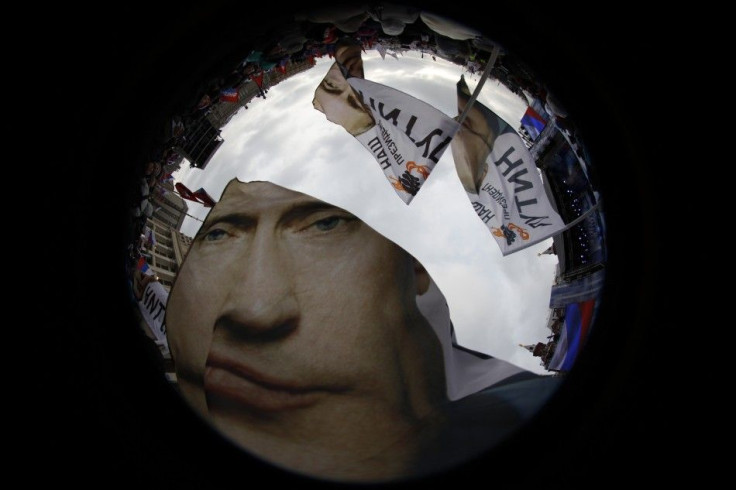Putin Victory Rally Attendees Were Paid: Just Another Crazy Stunt

There isn't a politician on Earth who can pull insane publicity stunts like Vladimir Putin can.
The incoming Russian president has staged several ridiculous photo-ops over the years: Putin shirtless on a horse. Putin shirtless while fishing. Putin shooting a whale with a crossbow and shooting a tiger with a tranquilizer.
Putin piloting a plane. Riding a motorcycle. Spinning out in an F1 racecar. Discovering ancient Greek treasures underwater during a scuba dive.
And now: Putin paying people to show up at the Kremlin and watch him cry.
A reporter for Time has confirmed that some of the audience members at Putin's tearful victory speech stood in line after the event to collect 300 rubles each. Some had to wait longer than expected and got impatient, complaining to nearby journalists. This is our cheap, low-down, nasty democracy, said one 44-year-old woman. Putin buys people like us.
The man doling out cash payments to the participants was unapologetic. It's a paid flash mob, he said. What? It's normal.
Arranging for favorable turnouts at public events is neither uncommon nor illegal. But after an election widely panned for being corrupt and underhanded, news of compensation for rally attendees just adds fuel to the fire.
Putin, who was first elected to the Russian presidency in 2000 and reached his limit of two consecutive terms, continued to wield power after his successor, Dmitry Medvedev, nominated him as Prime Minister. He will now swap jobs with Medvedev, officially regaining his presidential post on May 7.
When Putin first became president 12 years ago, he brought a period of stability and growth. But now that things are falling apart, an increasingly vocal public is turning on him. Federal spending is extremely high, and Putin has already promised more expenditure for national defense, professional salaries, children's education and more. Russian Finance Minister Anton Siluanov revealed to Reuters that these promises may cost up to 2 percent of GDP annually. This is especially troubling now that fluctuating prices are threatening Russia's oil and gas exports, an important source of income. And since Europe is Russia's biggest market, the currency woes that have crippled the euro zone are spilling into Putin's territory.
Public dissatisfaction has led to an emboldened media and waves of public protests, which reached a tipping point in September when Putin first announced his intention to retake the presidency.
Still, Putin's reelection was never really in doubt. The Kremlin had barred most viable competitors; they also ran a successful propaganda campaign to inspire fear of change in broad segments of the electorate, particularly lower-income voters out in the provinces.
And then there was the alleged rigging. An independent monitoring organization called Golos reported many instances of single voters submitting multiple ballots, as well as coerced voting. And several members of the opposition -- groups behind the ongoing protests--found evidence of ballot-stuffing and illegal absentee voting. All these efforts in place, Putin came away with the support of almost two thirds of the electorate.
We have gained a clean victory! said a wet-cheeked Putin on Sunday as paid audience members looked on. We won! Glory to Russia!
© Copyright IBTimes 2025. All rights reserved.






















